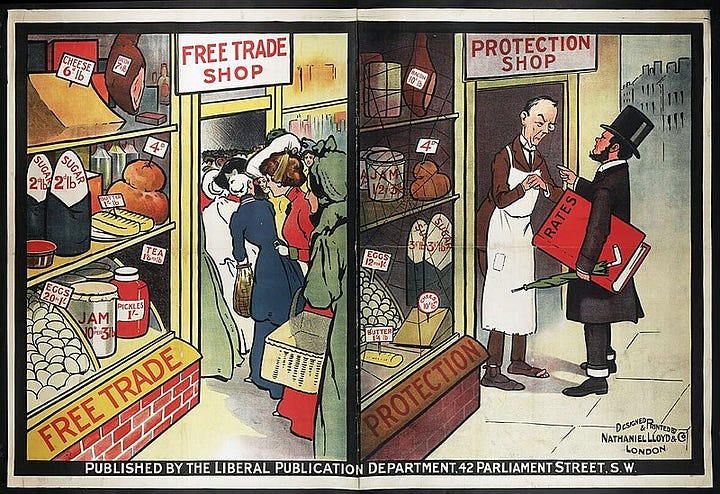


In this essay I ask: Are conservatism and capitalism falling out of love? I realise some conservative thinkers would answer that they never were in the first place (my own father was one such). But in modern times, the political/economic choice at election time could crudely be framed in these terms: Want more capitalism and less state intervention?....then vote conservative. Now this core belief in free-market capitalism is coming under serious interrogation in the liberal West for the first time since the 1930s.
The proximate cause has been a growing public exasperation at the social stresses and downsides of what has come to be known as Globalisation. [Strictly speaking it would be more accurate to say ‘latest wave of globalisation’ as European imperialism was a kind of globalisation too.] The latest wave – as with previous ones - has been great for some; for others not so much. For Western populations, it has been great for consumers and at least some of the laptop classes but not so great for what used to be called the working classes. A simmering, visceral anti-globalism reaction has set in across the West. It certainly formed part of the political chemistry that propelled Donald Trump to the White House in 2016 (and influenced the economic policy of the Biden administration ...‘reshoring’, import tarrifs, subsidies etc.) It has been making political waves in continental Europe; with anti-globalist political parties – such as France’s National Rally - making gains at the expense of Europe’s entrenched Leftist establishments.
aspects of the global economy have led some to question whether a tipping point has now been reached where downsides are starting to outweigh upsides.
It is not that any economically literate thinker on the Right side of the political aisle is questioning Adam Smith’s fundamental truth that the wealth of Western nations could not have happened without free-market competition as its driving force. But certain aspects of the global economy in the early 21st century have led some to question whether a tipping point has now been reached where downsides are starting to outweigh upsides. I myself am one of many old-school conservatives who have had to rethink some long held assumptions about the economic facts of life. The biggest shocker, for me, has been the emergence of Woke Capitalism - something I never saw coming. (and will be writing on in a future essay).
National Conservatism
The idea of Globalisation as a solvent destroyer of social fabrics – as laissez-faire-gone-too-far - has been gestating in various (mainly American) conservative think-tanks for some years now. The critique encompasses complex and wide-ranging issues....over-extended supply chains, de-industrialisation, gaming of international rules of trade by nations of widely divergent cultures, atrophying of the local community economic bonds that hold those cultures together. And it also encompasses an even more radical departure from mainstream conservative thinking...the idea that Western Liberalism itself is approaching the end of its 300 year trajectory. This ‘post-Liberalism’ thinking is articulated in Patrick Deneen’s Why Liberalism Failed (more on this too in a future essay).
These intellectual discontents acquired a more emotive, less abstract voice with the publication in 2016 of J D Vance’s bestselling memoir Hillbilly Elegy. More recently they have attracted wider publicity through media coverage of the National Conservatism Conferences that have taken place around the world since that organisation’s inception in 2020. This so-called Economic Populism has also begun to get sympathetic media attention beyond its dissident-rightist base. As in this article in The Wall Street Journal which is normally thought of as a bastion of establishment economic thinking:
[heavily edited extract] The first element [of a conservative economic programme] is agreeing with populist conservatives that markets don’t always work perfectly and that a hands-off approach isn’t always the solution..... Supply-chain restrictions and export controls can be tools to deny national-security-sensitive technologies to adversaries such as China. ....A modern conservative economic approach would not only promote competition but also prepare more individuals to compete in a changing economy....[for example] understand local job needs....Third and most important, a conservative economic platform should recall why conservatives have stressed the benefits of markets.....“mass flourishing”. As far as government’s role, a contemporary economic agenda should recognize a limited measure of successful industrial policy.
As a potential political project in America, ideas like these have acquired sudden new impetus by the rising star of J D Vance as Donald Trump’s vice presidential running mate. I personally am broadly sympathetic to the idea that globalisation has indeed reach a tipping point but if Western nations were to chart a different course – then some issues need to be confronted:
Reckoning the potential economic costs of this new course as well as the benefits (There’s always costs and benefits). Are we happy to pay more for consumer goods? Would we be OK with lower GDP growth rates? etc
In a hyper-connected digital era, can globalism realistically be constrained by political actions? After all, nobody forced the world’s economy to globalise; it laissez-faired itself that way.
I cannot stress enough how much I share the sense that the fraying of community bonds is perhaps the greatest threat to the continued thriving of Western societies. But I have my doubts about the ability of anti-globalist politics to do much about this. I am not a great believer in political solutions....more a believer in unintended political consequences. My instinct is that neither the national nor the global economy is really controllable in the age of the internet. Things will be what they will be.
I do however wish that - globalised or not – Western democracy had resulted in a higher degree of voter comprehension of these macroeconomic complexities.** In the rest of this essay I briefly explore certain rabbit-holes that a poor understanding of it can cause people to fall into.
Macroeconomics as a fascinating subject
To frame the competition between Capitalism vs Socialism as worldviews in slightly more technical terms, it is a dialectic about the virtues of Market Economies vs Command Economies. On the one side is Adam Smith’s profound insight that people's natural self-interest - operating in a competitive ‘marketplace’ - is the most fruitful engine for channelling man’s energy, inventiveness and ingenuity; and thereby the most fruitful engine of economic prosperity for all citizens of a nation . On the opposite side is the utopian dream of a world remade such that there shall be fair shares for all – This dreamscape has been a highly seductive one down the ages; all the way from Rousseau via Marx to the present day. The huge inequalities of wealth and power in a dog eat dog world, it says, can – and must – be ironed out. And the way to achieve this is by political intervention – command and control of the means of production distribution and exchange. To my readers on this Substack, I do not think I need to rehearse, in any detail, stories of the comprehensive historical failure and ugly consequences– both intended and unintended - of this utopian dream world. Except to say that its seductions remain potent to this day and indeed are constantly renewed in a certain kind of naive adolescent mindset.
At the end of the 80s, with the collapse of utopian socialism in the Soviet Union and elsewhere, laissez faire capitalism - undergirded by a humane but limited welfare safety net - seemed the only way to go. So much so that even quasi-socialists like Bill Clinton and Tony Blair were on board with it. But thirty years on - despite my pessimism about their ability to do anything effective about it – I do think that the economic populists et al have a strong case to argue that our recent history of internet- turbocharged globalisation has taken laissez-faire down a wrong track. Adam Smith - widely seen as the father of laissez-faire capitalism - would, if he were alive today, have agreed....probably.
Contrary to a commonly held caricature, Adam Smith was as much social psychologist as economist and his philosophy was certainly not one of valorising greed. His profound insight was that a combination of two of mankind’s primary driving forces – self-interest and ‘natural sympathy’ – working together could be an “invisible hand” guiding it towards a collective thriving....... as these two quotes illustrate:
He [ie mankind] intends only his own gain, and he is, in this, as in many other cases, led by an invisible hand to promote an end which was no part of his intention.
How selfish soever man may be supposed, there are evidently some principles in his nature, which interest him in the fortune of others, and render their happiness necessary to him, though he derives nothing from it except the pleasure of seeing it.
The most trenchant critique of globalisation in my view is that Adam Smith’s ‘natural sympathy’ can only really be sustained at a societal scale where some collective sense of community exists. This can also be sustained (to some extent at least) at nationhood scale but at a global scale it becomes hopelessly attenuated -to the point of non-existence. Although I know of no solution to this - in a world relentlessly globalised by the internet – recognising it has led me to question my former faith in laissez-faire capitalism.




I do know however that looking to any kind of quasi-socialist command economy as an answer remains the delusional rabbit hole that it ever was. And talking of which, it is worth briefly taking a detour to another command economy rabbit hole that is easy to fall into – the misplaced but commonly held notion that ‘extreme’ concentrations of wealth need to be tackled because they ‘make the rest of us poorer’. In my days as an occasional contributor to various magazines (before I switched to Substack) I published a few economics pieces and below I revisit an extract from one of them to illustrate the fallacious nature of this view.
Economic truths and myths… about wealth inequality for instance
According to Time magazine : “A staggering $50 trillion. That is how much the upward redistribution of income has cost American workers over the past several decades.” Economics as a zero sum thing in other words. Given enough media encouragement, few things are more guaranteed to arouse outrage than reports comparing the wealth of billionaires and zillionaires to that of ordinary folk. This censoriousness about the excesses of princes and plutocrats is understandable and mostly harmless. But when coupled to the superficially plausible notion that the billionaire’s dollars has been ‘taken from’ the rest of us (and that the rest of us are a billion dollars less well off as a consequence) it fosters an economic fallacy that could impoverish us all.
To illustrate the fallacy, imagine oneself as a billionaire?..... Well, you would of course have a string of luxury homes dotted around various global plutocrat hotspots and a staff to run them all. And let’s suppose you would also commission for yourself a luxury yacht and a private jet to ferry you, at a whim, from one home to the next. Plus so many luxury motor cars you wouldn’t even be able to count them all. Add to all this luxury hardware and fixed overheads (insurance, staff etc) a great army of other people to manage your luxurious lifestyle for you...to fawn over you and handle all the boring stuff: tax consultants, style consultants, health consultants....and bodyguards of course. You’d have parties, the finest wines, caviar and so on. You’d spoil all your sexual partners with largesse to keep them sweet on you. You might indulge yourself with a stratospherically expensive personal art collection and you might buy yourself a football club as well. You’d indulge yourself in fact with every last thing you could think of.
Two truths emerge from this What If fantasy but they are truths that can be somewhat counter-intuitive. The first truth is that no human being, however greedy, can possibly personally consume billions of dollars. It cannot disappear down their throats in other words – or into their safe. What the billionaire’s wealth does give them is a large degree of control over other people’s livelihoods. It does this both directly as described above plus indirectly in the way they choose to invest their huge capital assets.
The second truth is that every cent of the billionaire’s wealth, whatever they decide to do with it, is, at the end of multiple lengthy transactional chains, someone else’s livelihood. This applies to every piece of hardware and services consumed by them, whether directly or indirectly. And the greater part of those myriad transactions will be the salaries of countless thousands of employees in various manufacturing and service industries. All the way from relatively well-healed professionals, to office workers, factory workers, shopkeepers, waiters and cleaners. Even the millions paid for the private art collection will release capital that will end in someone else’s pocket, somewhere in the world; ultimately millions of pockets.
....back to National Conservatism
National Conservatism is a nascent political movement operating on a much broader front than just the economic consequences of globalisation. In the past 3 to 4 decades the Progressive Left has re-invented itself from its former focus on a collectivist economics fairytale to a new selective-victimhood /grievance fairytale which has then - very successfully - coursed its way through the arteries of each and every Western institution from the church to the military. In this way it has done immense (and still unfolding) damage to the social and cultural fabric of Western civilisation. National Conservatism sees itself as a counter-insurgency against both this Leftist political and cultural hegemony and the neoconservative Right’s decades of complacency in the face of it…. its failure to do more than just apply a gentle foot on the brake.
But the focus of this essay has mostly been on National Conservatism’s anti-globalist instincts. So.... (in my view) key things to keep in view are:
Free market capitalism - as an outcrop of 18th century Western Liberalism - has made much of the world immensely richer. Yes its ‘laissez-faire’ nature leads to huge wealth inequality. But this does not really impoverish the rest of us in the way that so many imagine.
But a realisation has been growing in recent decades that the Liberalism/capitalism nexus that has been so good for us, has perhaps also carried the seeds of its own eventual destruction. A fatal flaw wherein it knows no boundaries....geographical or moral. Globalisation and woke capitalism both seem to me to be outcrops of this fatal flaw.
I am agnostic about the ‘economic populist’ aim to rein in free markets so as to constrain them more within local and national boundaries…. ‘reshoring’, import tarrifs, subsidies etc. I am not against this but I do suspect that – for the reasons I have laid out in this essay - it may have as many unintended consequences as intended ones.
And for those who worry that it risks killing the free-market golden goose, it’s perhaps worth remembering that capitalism has only ever been relatively (not absolutely) laissez-faire.
** [Although I never thought of making it a profession, economics has always fascinated me for some reason ...right from childhood in fact!]




I'd suggest there are two issues, the first is the conflation of distribution (free markets) with ownership (capitalism). We want a decentralised, network economy with multiple player that allows competition and innovation, not a handful of giants that can lobby for rules to crush smaller rivals and new entrants. I'd suggest alternative models of ownership such as partnerships, employee and customer owned mutual's, trusts and franchises instead of PLC's.
The second is that the right has prioritised economics over social and cultural issues and needs to think more about meaning and what is a life well lived over just maximising wealth. The Tory party used to be the party of 'Church, King and Country', which of these, or anything else do the believe in now?
A more humble analysis on Adam Smith vs John Keynes, or conservative economics vs Marxism, would certainly reach the views you herein reach. Current levels of "debate" extend not much beyond me good, you bad. Thank you for taking us closer to understanding real world economics.